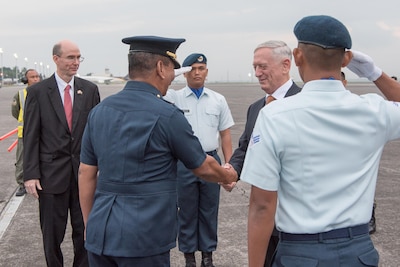By Jim Garamone DoD News, Defense Media Activity
WASHINGTON, Oct. 23, 2017 — Strengthening ties with allies,
increasing defense capabilities in the Indo-Asia-Pacific region and discussions
about the threat of North Korea are among the topics Defense Secretary Jim
Mattis will contend with on his trip to the region, he told reporters traveling
with him yesterday.
The secretary arrived in the Philippines this morning
Washington time. He laid out his agenda for the trip during an in-flight news
conference.
Mattis will meet with Philippine officials before taking
part in the Association of Southeast Asian Nations defense ministerial set for
Oct. 23-25. That meeting is at the former Clark Air Base.
“One of the first things I’m going to do when I get there is
commend the Philippine military for liberating Marawi from the terrorists,” he
told reporters. It was a very tough fight, as you know, in southern Mindanao.
And I think the Philippine military sends a very strong message to the
terrorists.”
The Armed Forces of the Philippines battled forces allied
under the Islamic State of Iraq and Syria in Marawi. Coalition forces helped
the Philippine troops with intelligence, advice and logistic support. While
small pockets of terrorists remain, the government declared the city liberated
Oct. 17.
ASEAN
The association has been in existence for almost 50 years
and is a force promoting peace and stability in the region. It is a forum for
the nations to discuss issues among themselves and hash out ways to cooperate that
brings prosperity to the region, Mattis said. The meeting also marks 40 years
of friendship and cooperation between ASEAN and the United States.
“ASEAN provides an international venue, giving voice to
those who want relations between states to be based on respect, not on
predatory economics or on the size of militaries,” he said. “ASEAN nations have
demonstrated that they can listen to one another, they identify opportunities
to increase defense cooperation for their own security and seek shared
solutions to shared concerns. The U.S. remains unambiguously committed to
supporting ASEAN.”
The secretary will take advantage of his time at the meeting
to visit with his regional counterparts, he said. In addition to meeting
Philippine counterparts, Mattis is scheduled to meet with representatives of
Japan, South Korea, India, Indonesia and Malaysia.
He will also hold trilateral talks with Japanese and South
Korean defense officials.
North Korea
Mattis said the regional distubances created by North Korea
will be on the agenda at ASEAN. He said will also emphasize the shared values
the nations of the alliance have, the territorial sovereignty of the nations
and the need for “freedom of navigation through historically international
waters and fair and reciprocal trade.”
At the conclusion of the meeting, Mattis will lead the
official U.S. delegation to the funeral of Thai King Bhumibol Adulyadej, who
died in October 2016. The royal cremation rite ends the period of mourning for
the country -- one of America’s treaty allies in the region. “He was
understandably beloved by his people and a proponent of our strong
Thailand-United States relationship,” the defense secretary said.
After the ASEAN meeting ends, Mattis will move on to Seoul,
where he and South Korea’s Dfense Minister Song Young-moo will co-chair the
49th annual Security Consultative Meeting. “There, we will underscore our
ironclad commitment to each other,” Mattis said.
North Korea is a threat to the region and globally, defense
officials have said. Two unanimous U.N. Security Council resolutions have
isolated the state from the rest of the world. The U.N. acted after North Korea
detonated nuclear devices and flew an intercontinental ballistic missile over
Japan. During his meetings in South Korea, the secretary said he will discuss
reinforcing diplomatic efforts to return to a denuclearized Korean peninsula.
The defense leaders will also discuss “how we are going to
maintain peace by keeping our militaries alert while our diplomats -- Japanese,
South Korean and U.S. -- work with all nations to denuclearize the Korean
peninsula,” Mattis said.

No comments:
Post a Comment